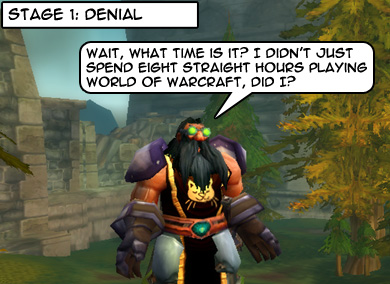
Yesterday was the official "bash virtual worlds" day in the UK press. With the launch of the latest World of Warcraft expansion (Wrath of the Lich King), news sources went overboard in the coverage of thousands of costumed geeks queuing outside Oxford Street's HMV; at some point the game's launch was the top story in both the BBC and the Guardian, with legions of Tauren and Night Elves adorning the streets of London attracting similarly large numbers of journos and papparazzi. The tone of the coverage has been mixed, but the overarching theme has been set by the Today program, the BBC 4 flagship radio news and current events show which usually sets the agenda for the days news throughout the British media. The technophobes in chief at Radio 4 decided to run not with celebratory coverage, but with a report about the dangers of online game addiction kicking the day's news. Then we were treated to similar coverage, with one doctor being interviewed about the many teenagers falling prey to the evils of game addiction. Further reports stressed on the addiction element. Other news outlets continued the trend, the Telegraph reported on one gamer who collapsed after queuing for 40 hours without food or water, the Times lamented about WoW Widows, while the Daily Mail was uncommonly subdued. At the other end of the spectrum, the tech-friendly Guardian adopted a more balanced reporting. The main story did contain some talk about the addiction controversy, but there were several comments against the seemingly unstoppable tide of negative articles: Alex Sassoon Coby wondered why the game is so popular, Rowenna Davis wrote an astute comment about the virtual versus physical reality, Naomi Alderman made a rather preposterous post about how gaming helped her go through post-9/11 trauma, while the always enjoyable Jack Schofield wondered if WoW can save people from TV addiction. Jack says:
"Millions of British people are addicted to something they call "the boob tube". Every night they slump for hours in front of a flickering box, having their brains rotted by a continuous diet of mindless pap. They could be doing something interesting with their lives, but they need a continuous stream of stuff, and it's available right round the clock. They can't go out, they don't have time for proper meals, they can't even take a bathroom break when they need one. If they miss a dose due to holidays or illness, they start trying to "borrow tapes" or even going online to hunt down that missing episode of EastEnders, Coronation Street, Strictly Come Dancing or whatever."
Granted, while the addiction angle was down-played by some outlets, the day was capped by another virtual world story. By the afternoon, Warcraft geeks had been pushed from the headlines by the sad story of Amy Taylor and David Pollard, a married couple (both on and offline) who had an extensive presence in Second Life. Ms Taylor filed for divorce from Mr Pollard because she allegedly caught him chatting intimately with another SL character. Ms Taylor told the Daily Mail that "It may have started online but it existed entirely in the real world and it hurts just as much now it is over." The news coverage that ensued had a tinge of sensationalism mixed with the very clear implication that there is something clearly wrong with these people. Perhaps I am being slightly unfair to journalists and commentators. The SL divorce story is indeed farcical, but the world is filled with all sorts of sad people who end their relationships for less of an excuse. Where are the stories covering the thousands of divorces due to email, SMS, chat rooms, and Facebook?
While I have low expectations of the British media, it seems to me that there is a deep Luddite vein that is exploited repeatedly whenever games and virtual worlds are concerned. For most people, gaming simply replaces other entertainment activities, such as reading, watching TV, or listening to the radio. When you boil it down to basics, gaming is a way of removing oneself from reality and experiencing other points of view. But is that not the same of reading? When reading I have spent countless hours lost in Middle Earth, visited Macondo, explored the Galaxy in Culture ships, and metamorphosed into a giant insect. On TV I have followed the perilous journey of the Battlestar Galactica in its brave escape from the Cylons. In cinema I have witnessed the triumph of the Rebel Alliance, followed the romantic adventures of a French waitress, and seen seven brave samurai rescue a village from bandits. Those are hours of my life "wasted" in other realities instead of "being outside" doing "real things" and interacting with "real people". Are there people who abuse gaming? Sure! But so do lots of people who abuse alcohol, knitting and sport. To me this is the most fallacious of dichotomies, people who are inclined to spend 12 hours in front of a computer screen playing a game are not likely to suddenly go out and become involved in "real life" if you switch the computer off.
What really worries me is that the talk of "addiction" is usually followed by concerned calls of people asking the government to "do something about it". I am just waiting for the first call by someone to think about the children. I will then run out of the room screaming. Thankfully, the gamer stereotype will be shifted by demographic changes, as more and more people will have grown up with computer games (hey, even celebrities are doing it!)
For the record, I'm not buying Wrath of the Lich King, I'm bored of Warcraft.

 del.icio.us
del.icio.us











